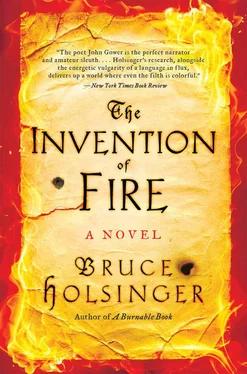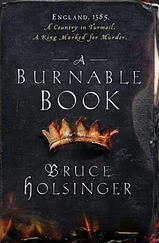Bruce Holsinger - The Invention of Fire
Здесь есть возможность читать онлайн «Bruce Holsinger - The Invention of Fire» — ознакомительный отрывок электронной книги совершенно бесплатно, а после прочтения отрывка купить полную версию. В некоторых случаях можно слушать аудио, скачать через торрент в формате fb2 и присутствует краткое содержание. Год выпуска: 2015, Издательство: HarperCollins, Жанр: Исторический детектив, на английском языке. Описание произведения, (предисловие) а так же отзывы посетителей доступны на портале библиотеки ЛибКат.
- Название:The Invention of Fire
- Автор:
- Издательство:HarperCollins
- Жанр:
- Год:2015
- ISBN:нет данных
- Рейтинг книги:3 / 5. Голосов: 1
-
Избранное:Добавить в избранное
- Отзывы:
-
Ваша оценка:
- 60
- 1
- 2
- 3
- 4
- 5
The Invention of Fire: краткое содержание, описание и аннотация
Предлагаем к чтению аннотацию, описание, краткое содержание или предисловие (зависит от того, что написал сам автор книги «The Invention of Fire»). Если вы не нашли необходимую информацию о книге — напишите в комментариях, мы постараемся отыскать её.
The Invention of Fire — читать онлайн ознакомительный отрывок
Ниже представлен текст книги, разбитый по страницам. Система сохранения места последней прочитанной страницы, позволяет с удобством читать онлайн бесплатно книгу «The Invention of Fire», без необходимости каждый раз заново искать на чём Вы остановились. Поставьте закладку, и сможете в любой момент перейти на страницу, на которой закончили чтение.
Интервал:
Закладка:
The guards left him in the yard and disappeared through a low door in one of the wide, squat buildings set against the inner wall. Marsh turned to watch the light cavalry at their martial labor. Champing and impatient in the mellow sun, the horses were agile, well muscled, light on their feet, their riders showing off for the king’s archers watching from a side rank. As London had armed itself over the preceding months it had pressed whole hosts of brigades from the shires, regional forces brought in to augment the defenses of the city and the Tower. A mongrel army, was the talk, with little overall discipline, reliant on these pockets of ferocity and skill to engage an enemy of sprawling numbers and unknown strength.
“Forward!” the captain shouted. His board-straight back was to Stephen, his gaze sweeping the company, advancing in three unequal ranks. Four in front, then eight, then twelve. A wedge, as Stephen saw it, the first meant to penetrate the enemy’s ranks, with the subsequent lines pouring in behind. The captain backed his horse as he surveyed the moving lines, barking directions here and there.
“Marsh.”
Stephen turned to see William Snell standing calmly behind him. He performed a half bow that was answered by a slight nod from the armorer, who assessed him through narrowed eyes birdlike and quick. Snell was a short man, yet taut and muscled, seemingly compacted from the same iron and rock making up the engines and walls around them. As in the tavern a few nights before, he was dressed with little regard to fashion or station, with a laceless and undyed coat thrown over his shoulders and fastened with a belt of twisted wool. The sleeves ended at his elbows in ragged hems, showing strong forearms that ended in thick wrists and fine-boned but coarsened hands.
He caught Stephen looking at his attire. “I am a workingman, Marsh, like you and your men, not some ink-stained scrivener polishing his arse all day in the chancery. Come along.”
Turning past the church, Snell took him along a path between the edge of the yard and the low buildings against the north wall, which were joined by a cloisterlike covered walkway built of rough beams and boards. Once inside the airy passage Snell led them from storeroom to storeroom, pausing at every turn to allow Stephen to marvel at the quantities of arms kept by the privy wardrobe. Whole chambers were given over to infantry armor and helms, all glistening with a pungent grease to ward off moisture and rust. Plated shields were stacked by the dozens from end to end and from floor to ceiling, their straps and braces removed for ease of storage and stuffed in bulging sacks suspended from the beam ceiling. The next room was a forest of whittled wood and low skeins of hempstring for the making of bows. Another consisted entirely of crossbow bolts. These were wrapped by the score in leather and thongs, the bundles stacked to the ceiling in the hundreds. Four, perhaps five thousand bolts, by Stephen’s estimation, all neatly stored for easy removal when war finally came.
Now the guns. Snell guided Stephen to the base of one of the larger towers in the complex, looking back at him with a flicker of quiet pride. They stood before a long, narrow portion of the main yard glistening with gunmetal. A team of carpenters was at work fitting the area with an addition to the sloping roof, fixed with notched rafters extending from the lower south wall to the higher tower wall on the north side. Only half the structure had been completed, leaving twenty bare beams jutting like bent masts from beneath the boards.
Snell placed a hand on Stephen’s back. “The guns themselves are just metal, of course,” the armorer said. “Without powder and shot they are no more than water pipes. We have laid in enough shot-iron, lead, stone-for the defense of London. Of twenty Londons. Look there, and there.”
Piled in this portion of the yard were projectiles of numerous shapes and sizes. Pyramids of smoothed stones, crates of iron balls, purses of lead shot, as well as several pairs of casting molds leaning against the stone and answering to the large foundry arrays positioned along the wall. In another temporary room off the yard Snell showed him the strange tools and mechanisms crafted for the charging of the brutal weapons: drills and firing pans, rods and touches.
A cluster of long and narrow tubes sat against a corner timber. Stephen’s steps slowed. “May I handle these, Master Snell?”
“At your pleasure, Marsh,” said the armorer, looking pleased.
Stephen hefted one of the peculiar guns, inspected it top to bottom. Hollow for its full length, but capped at one end and flared at the other, with a small hole bored through near the capped end. He fingered the hole, guessing at its purpose.
“Come,” the armorer said.
Two sentries stood to either side of a heavy wooden door, crossed by strong widths of dulled metal. Six separate locks were positioned along the sides, two of them fastened through eyeholes at either end of an iron bar. Each sentry held the keys to two of the locks on his respective side, and opened them at the armorer’s order. Snell worked at the two bar locks, struggling to lift the heavy rod crossing the whole. It fell to the floor with a loud clong, bringing another guard hurrying around the corner from the yard. Snell waved him off.
“And here, the heart of the Tower,” he said to Stephen. “The heart of England, some would say.”
The door groaned open to reveal a modest chamber, no larger than the streetfront room back at the Stone foundry. There the similarities ended, and Stephen could only gape in the half-light cast by the barred window. At least one hundred kegs, each the height of a small child, all banded with iron and tightly sealed. The air was sharp, tinged with the thousand or more pounds of gunpowder sealed in the close chamber. Marsh’s eyes watered, his nostrils burning in the acrid air.
Snell scrutinized him. “The most dangerous room in all England.”
“Aye, Master Snell,” Marsh rasped, imagining what a single coal could accomplish in this enclosed space.
“It’s taken a few years to build up an adequate supply,” said Snell, a touch of fatherly pride in his voice as he surveyed the lethal store. “Endless shipments of saltpetre. Carts and carts of sulfur and coals, the piss of a hundred bishops.” He laughed. Stephen smiled. “But well worth the effort, and we have learned of late how to mix a more stable powder, with a purer burn. Let the forces of France and Burgundy only try to take this fortress. Let them assault this city and its walls, and with everything they have. I shall welcome the challenge, Marsh. Welcome it. From any quarter.”
Stephen imagined such a scene. Rivers of blood, brains and offal, limbs blown across the Thames, all from the power of guns.
Snell closed the heavy door, supervised the replacement of the locks, then led Stephen to a quiet corner of the wardrobe complex. They climbed a flight of stone stairs to the upper level of a two-story structure built against one of the northwest towers. In the chamber were a low table and several chairs, a stack of ledgers, a few candles and lamps. A long sword and a battered shield leaned by the door. Along the western wall hung a map of the Tower, ruled and sketched on two thick widths of calfskin sewn roughly together and nailed to the boards behind. A window looked out on the whole of the yard, giving the armorer an impressive view of his domain. The room smelled of damp timbers and sawdust, a welcome change from the acrid wisps of powder still tickling Stephen’s nostrils.
Snell started to shut the door to his chamber behind them. It caught on the latch. The armorer had to pull for a moment before the door came closed. “Must have that repaired,” he mused as he gestured Stephen toward one of the chairs. “Sit,” he said.
Читать дальшеИнтервал:
Закладка:
Похожие книги на «The Invention of Fire»
Представляем Вашему вниманию похожие книги на «The Invention of Fire» списком для выбора. Мы отобрали схожую по названию и смыслу литературу в надежде предоставить читателям больше вариантов отыскать новые, интересные, ещё непрочитанные произведения.
Обсуждение, отзывы о книге «The Invention of Fire» и просто собственные мнения читателей. Оставьте ваши комментарии, напишите, что Вы думаете о произведении, его смысле или главных героях. Укажите что конкретно понравилось, а что нет, и почему Вы так считаете.












